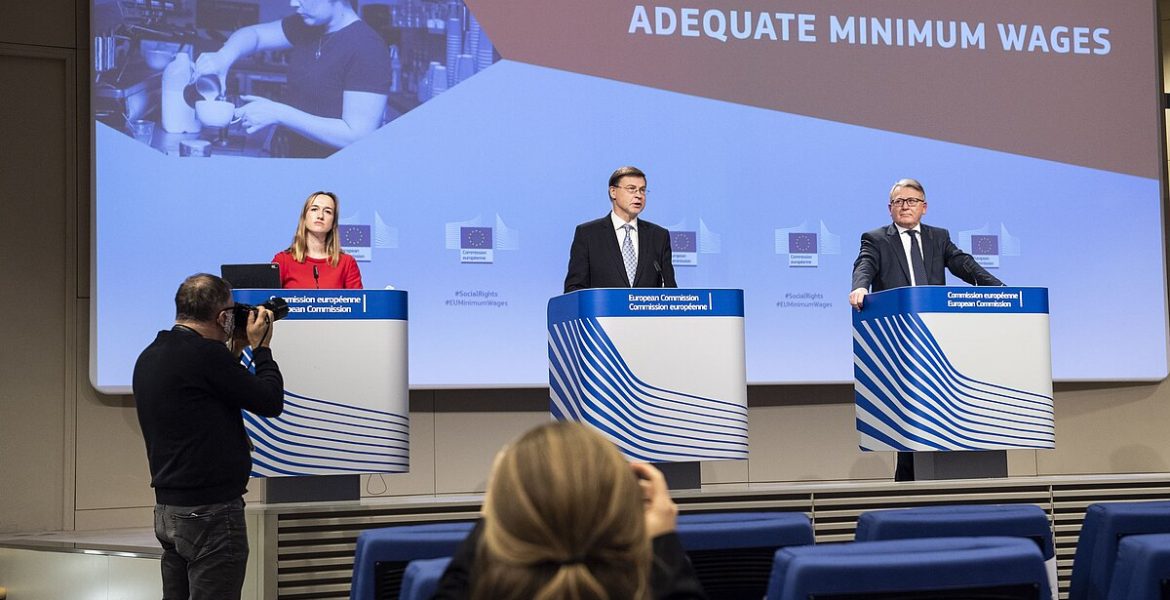The European Parliament’s employment committee has made a big step towards a European directive for minimum wages, which both strengthens and safeguards the different social models in Europe, by approving the report tabled jointly by S&D MEP Agnes Jongerius and EPP MEP Dennis Radtke. The Socialists and Democrats’ have spearheaded the campaign for a European Directive for Adequate and Fair Minimum Wages for many years. Commissioner Nicolas Schmit presented this much awaited proposal in October 2020.
MEP Agnes Jongerius, S&D spokesperson for employment and European Parliament negotiator for minimum wages, said: “Today, one in six employees in Europe does not earn enough to make ends meet. Even though they work a tough 40-hour week, they can’t pay for their rent, their food and their clothing. This must change. All European workers deserve our respect and fair pay.”
“I am proud that we could substantially improve the Commission’s proposal. Firstly, we insisted that minimum wages must be adequate and fair, and guarantee a decent standard of living. Statutory minimum wages must be a threshold of decency. Member states should check and report on the adequacy of statutory minimum wages. This can be guided by the international reference values of 60% of the median gross wage and 50% of the average gross wage in a country.”
“Secondly, through public procurement procedures we want to guarantee that public money only goes to companies respecting minimum wages and collective agreements. Member states must therefore reflect and report on what impact their spending has on collective bargaining coverage.”
“Thirdly, from my experience in the trade union movement, I know that strengthening collective bargaining is the best way to fight in-work poverty and guarantee decent working conditions. Therefore, member states, with the full involvement of social partners, have to come up with a national action plan with concrete measures and a clear timeline, if they do not reach a collective bargaining coverage rate of 80%. One thing is made clear in this report: collective bargaining is done by trade unions, and no one else. Protecting workers against adverse treatment and combatting union busting is of utmost importance to safe-guard our social models and must be an obligation for all EU governments.”
Pedro Marques, S&D vice-president responsible for social Europe, said: “In Europe, we are lucky to have a rich and diverse tradition of social welfare states. As Socialists, we are united by our values and in our political fight to make people’s lives better. Ensuring fair and adequate minimum wage protection for all Europeans has been a long-standing aim of our political family, and a key priority for our group.”
“We applaud Commissioner Nicolas Schmit for presenting this proposal and I congratulate my colleague Agnes Jongerius for the adoption of her report. This minimum wage directive is not a one-size-fits-all. On the contrary, it caters for different traditions and starting points, and strengthens trade unions and collective bargaining. Now is the time to deliver on our promise to make people’s lives better again. Work must finally pay again.”
“This directive will establish a framework for fair minimum wages in Europe but it will not set a common European minimum wage nor will it force member states that do not have statutory minimum wages to introduce them. It is clearly stated in Article 1 of the report: “(2) This Directive shall be without prejudice to the choice of the Member States to set statutory minimum wages, promote access to minimum wage protection in the form of wages arising from collective agreements, or both. (3) Nothing in this Directive shall be construed as imposing an obligation on the Member States where minimum wage protection is exclusively ensured via collective agreements to introduce a statutory minimum wage or to make collective agreements universally applicable.”
Kim Van Sparrentak, Greens/EFA MEP and member of the Social Affairs Committee, commented: “About 10 percent of the working population in Europe lives in poverty and it is mainly women who are paid below a living wage, rendering many unable to provide for themselves and their families. With this proposal, minimum wages should contribute to reducing poverty and closing the gender pay gap.”
“Those who work must be able to provide for themselves and this should never be questioned. That is why it is important that the minimum wage per country is based on a basic basket of goods and services including, among other things, the costs of adequate housing, healthy food, clothing, transport, health care and participation in culture and education.”
“With this proposal, certain self-employed workers, such as platform workers, will also be entitled to the minimum wage. Moreover, trade unions must also be able to unionise workers without a physical workplace.”
“This vote is one step towards a more social Europe.“




